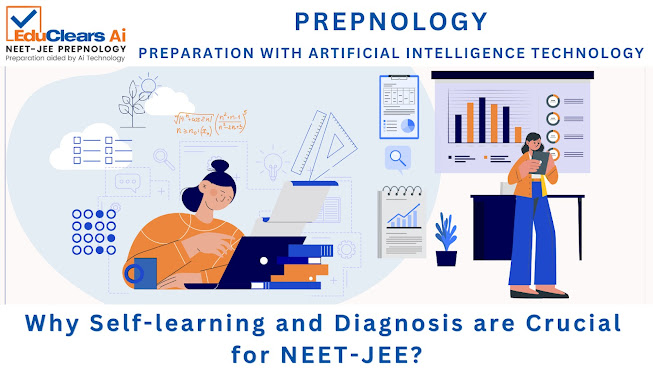WHY SELF-LEARNING AND DIAGNOSIS FOR NEET AND JEE IS CRUCIAL?
When a student is serious about doing well on the NEET and JEE exams, self-learning and diagnosis for NEET and JEE is crucial. Every student wonders which career route will be best for them after taking the board exam. Making the right career choices is an important life choice. Here the two most prevalent occupations are medicine and engineering.
Passing the NEET and JEE exams is a requirement for students who want to study medicine or engineering. The National Eligibility Cum Entrance Test (NEET) and Joint Entrance Examination (JEE) are the two most challenging admissions tests in India. Likewise, there is a very high degree of competition. These tests are taken by a lot of learners each year, but the success rate is incredibly low compared to the number of students who take the test. Engineering and medical schools have a limited number of seats available. To get into the college of your dreams, one must perform really well.
But why do every year only a selected number of students that appear for the exam every year get a chance? Students are failing to achieve the expected outcomes even after receiving the best coaching and tutoring. The fundamental issue here is a lack of self-learning and diagnosis for NEET and JEE. We shall discuss the significance of self-learning and diagnosis for NEET and JEE in this blog.
WHY SELF-LEARNING AND DIAGNOSIS FOR NEET AND JEE IS CRUCIAL, AND HOW CAN WE PROCEED WITH THEM?
Many students might question whether self-learning and diagnosis are actually important for success in the NEET and JEE. Yes, will be the response. Let's discuss the significance of self-learning and diagnosis for NEET and JEE.
For any exam, preparation is the key. One cannot do well without adequate preparation. There are a few pieces or components of readiness, although. In those components Primary education is the first action. There are several places from where primary education can be taken, such as schools, private teacher coaching institutes, etc. There are many reputable coaching facilities and institutes that offer organized study plans for exams like NEET and JEE. However, not everyone is successful even after taking classes at these institutes.
If taking classes from the best instructors were sufficient preparation for the exam, then everyone or nearly all of the students would have scored highly. The reason this isn't happening, though, is that self-learning is the most important thing to do after taking the primary learning. It's important for students to develop self-diagnosis skills and confidence.
Students attend classes and take tuition every day, but how much of the content they are taught do they actually comprehend? Each learner has a unique level of understanding. Some individuals may first comprehend a subject, but after returning from coaching, they may forget the majority of what they had learned.
So what is the answer to this issue? This can only be avoided by regularly reviewing the material that is presented in class and self-diagnosing through tests. It will demonstrate how well they have comprehended the material. By examining test results, they may determine which areas are adequately prepared and which require further work.
It is crucial to review ideas that were previously taught at the same time. The problems of learning and forgetting are common. NEET and JEE students must undertake a self-evaluation to address this challenge. The toppers who give guidance on NEET and JEE, focus on self-learning and diagnosis.
FOR THE JEE AND NEET EXAMS, IT IS CRUCIAL TO PREPARE ONESELF. IS THIS A DIFFICULT TASK, THOUGH?
We can infer from all we've said thus far that self-learning and diagnosis for NEET and JEE is crucial. However, self-learning and diagnosis are difficult processes. It is challenging to identify the areas that need extra revision or those you have forgotten. Students usually repeat the full curriculum while only preparing a small part of it. It takes a long time to do this. It's comparable to plastering the whole body over a little fracture.
For repeat test-takers who have already taken the exam, it is particularly important as repeaters are already familiar with 80% of the material. They only need to concentrate on the little things. They will have to revise the entire topic if they don't self-diagnose, which could be detrimental to their preparation.
But thanks to Educlears, who had the idea to assist students who were having issues with self-learning and diagnostics for a NEET and JEE. Educlears can identify student’s knowledge gaps using the most recent artificial intelligence technology. Educlears have the ability to diagnose and cure students. That means that it both identifies and fills the void. A student can fully prepare oneself in this way. Their artificial intelligence technology can identify each student's unique needs and support them in receiving individualized guidance.
Thanks to Educlears, who had the idea to assist students who were having issues with self-learning and diagnosis by assessing each student's potential. Educlears has the ability to provide them with a thorough education while easing their difficult journey. Educlears is demonstrating self-learning and diagnosis for NEET and JEE in this practical manner. Visit their website, www.educlears.com, to discover more about how they self-diagnose candidates for the NEET and JEE exams. We anticipate that this blog on self-learning and diagnosis for NEET and JEE will provide each student with some guidance on how to organize their study strategy. We appreciate you for reading the blog. Thank you.
Read another blog: Can I successfully prepare for NEET exam without coaching?

.png)


Comments
Post a Comment